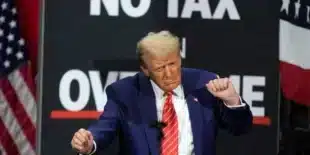Saudi Aramco, Saudi Arabia’s largely state-owned oil giant, is launching a new share offering, which comes at a critical time for the kingdom’s sweeping economic reforms that have struggled to attract foreign investment.
The sale involves 1.545 billion shares and is anticipated to begin trading next week, potentially raising nearly $12 billion. This influx of funds is intended to support various ambitious projects, including luxury resorts, sports stadiums, and the futuristic desert city known as NEOM.
This move aligns with Crown Prince Mohammed bin Salman’s Vision 2030 agenda, which aims to utilize the kingdom’s vast oil wealth to build a diversified, post-oil economy. However, analysts suggest that while the funds raised will aid in government spending, they won’t solve the broader issues surrounding the viability of Vision 2030, particularly the large-scale projects like NEOM.
Robert Mogielnicki from the Arab Gulf States Institute in Washington notes that the capital raised will boost fiscal resources but won’t provide a long-term solution for funding needs. Saudi officials have indicated that some Vision 2030 projects’ timelines may be extended, influenced by global events such as the Ukraine war, the pandemic, and economic disruptions.
Torbjorn Soltvedt of Verisk Maplecroft highlights the challenge of attracting foreign investors to long-term projects in Saudi Arabia. While there has been an increase in investment in the Saudi stock exchange, foreign direct investment remains below the target levels set by Vision 2030.
Initially proposed in 2016, the Aramco flotation aimed to list five percent of the company on a major international exchange. However, concerns over transparency and reluctance to sell national assets led to a more modest listing of 1.5 percent on the Saudi exchange in 2019, raising $25.6 billion.
This latest share sale underscores the government’s need to generate cash, particularly through the Public Investment Fund, which relies heavily on Aramco. Despite the massive investments and strategic shifts, foreign investment in non-energy sectors remains limited, often driven by government incentives rather than market appeal.
Saudi analyst Mohammed bin Saleh remains optimistic, pointing to non-oil GDP growth and describing Vision 2030 as “on track.” However, significant projects like NEOM are behind schedule, with some reports suggesting scaled-back targets.
Other developments, such as the Red Sea Global project, show more tangible progress, with several resorts already open and more planned by 2025. Nonetheless, the completion pace of these mega-projects lags behind the ambitious Vision 2030 goals.
As Saudi Arabia commits to hosting major events like Expo 2030 and the 2034 World Cup, further sales of Aramco shares seem likely, with continued strong investor interest expected. According to Jim Krane of Rice University’s Baker Institute, Aramco’s extensive assets and low-cost oil production remain highly attractive to investors.


